Organic foods are growing like gangbusters, but are they really better for you? Is organic worth the higher cost? There are certainly plenty of opinions on both sides of this debate. In fact, people can get pretty vocal on this topic with responses ranging from some swearing by organic to others calling it a huge scam. What’s the truth? Here’s my take on this hot topic.
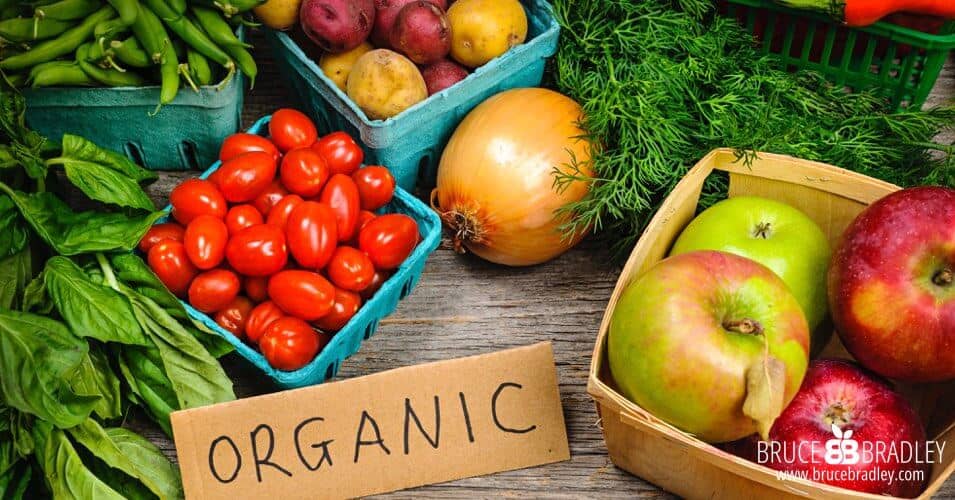
So What Does Organic Really Mean?
To really answer the question “is organic food better for you,” I think it’s best to start at the very beginning. That means understanding what the term organic really means when it comes to food.
Products that are certified organic are produced according to certain established standards. Although requirements differ from country to country, there’s a great deal of similarity across the globe.
In the United States organic standards are established by the USDA and include the following:
- Restricted use of pesticides and fertilizers: Certified organic food is grown without the use of synthetic pesticides, artificial fertilizers, or sewage sludge.
- Avoidance of GMOs: Production standards and practices are designed to prevent the inclusion of any genetically modified (GM) ingredients or the contamination of crops.
- No irradiation: Certified organic products must be free from irradiation, a process where radiation is used to kill potentially dangerous bacteria in food. Although there’s increasing agreement that irradiation is harmless 1 organic foods cannot be irradiated.
- Standards for the care and treatment of animals: Farms raising animals must follow additional rules concerning the care and treatment of their livestock to earn the organic certification. These include the use of organic feed, no use of antibiotics or synthetic growth hormones, and animals must not be confined 100% of the time as they sometimes are on conventional farms.
- Additional requirements include proof that the farmland has been free of restricted inputs for a number of years, written production and sales records, strict separation of organic and non-organic products, and on-going site inspections to ensure the farm is operating in accordance with all standards.
Beyond These Standards, What Does Choosing Organic Buy You?
Proponents of organic agriculture claim further advantages that extend well beyond these production standards and requirements. These additional benefits include:
- Organic food is more environmentally friendly by reducing greenhouse gases, diminishing groundwater pollutants from fertilizer and pesticides, and helping to create richer, healthier soil. These claims may be especially true of traditional, small-scale organic farming that support eco-sustenance—farming in harmony with nature through practices that build topsoil, encourage beneficial insects and pollinators, and promote biodiversity.
- Organic farming uses dramatically less energy than conventional farming. Research by the Rodale Institute (albeit an organization that promotes organic farming) conducted a 30-year farm trial. In that long-term trial it found that organic farming uses 45% less energy and is more efficient. 2 The main source of the energy savings may be surprising—conventional crops are highly dependent on synthetically produced nitrogen fertilizers made from petroleum.
- Organics are more nutrient dense: It makes sense that if your produce is grown in a healthier, more nutrient-dense environment then the resulting food should be better for you. Probably your best guarantee for getting nutritionally superior produce is to find a local, organic farm that works hard to build the nutrient content of its soil. Buying local also usually ensures the produce reaches you quickly—a very important factor in maximizing the nutrient density of your produce!
- Better tasting food is another claim many organic farmers make. While I definitely believe it’s true for fresh foods I purchase from local farms, it’s more up for debate when buying produce from large, corporate farms.
The Debate Over the Benefits of Organic Foods
Of course, as I alluded to earlier, there’s quite a bit of debate over the true benefits of organics. Rather than be one-sided in my approach, I thought I’d share some of the concerns as well as try to put them in some context.
Are certified organic products 100% organic?
In the United States there are four categories for organic labeling and claims. Two of the four organic ingredient claims are eligible to use the USDA organic seal. The USDA’s description of each claim is provided below: 3
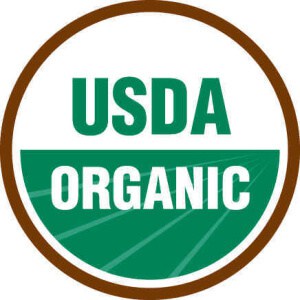
- “100 percent organic” can be used to label any product that contains 100 percent organic ingredients (excluding salt and water, which are considered natural). Most raw, unprocessed farm products can be designated “100 percent organic.” Likewise, many value-added farm products that have no added ingredients—such as grain flours, rolled oats, etc.—can also be labeled “100 percent organic.” This designation may include the USDA organic seal and/or 100 percent organic claim on the principal display panel.
- “Organic” can be used to label any product that contains a minimum of 95 percent organic ingredients (excluding salt and water). Up to 5 percent of the ingredients may be nonorganic agricultural products that are not commercially available as organic and/or nonagricultural products that are on the National List. This designation may include the USDA organic seal and/or organic claim on the principal display panel.
- “Made with Organic … ” can be used to label a product that contains at least 70 percent organically produced ingredients (excluding salt and water). The principal display may state “made with organic (insert up to three ingredients or ingredient categories)” but it must not include USDA organic seal anywhere or represent the finished product as organic, or state “made with organic ingredients.”
- Specific Ingredient Listings. The specific organic ingredients may be listed in the ingredient statement of products containing less than 70 percent organic contents—for example, “Ingredients: water, barley, beans, organic tomatoes, salt.”
Finally, some critics argue that certification doesn’t guarantee organic products from contamination with pesticides or GMOs. This is true, but let’s understand why.
To achieve certification you don’t need to submit analytical proof that your crop or product hasn’t been contaminated. Rather, you must show that you’ve followed all the procedures for certification. Therefore, if an organic farm experiences drift from a neighboring conventional farm that uses synthetic pesticides or pollen from their genetically modified crops, there is the potential for contamination. Organic farms typically work very hard to prevent this from happening, but the system isn’t perfect. Furthermore, analytical proof for all crops would be an extremely expensive undertaking.
Do organic foods use any pesticides?
Many people believe that organic foods use no pesticides in their production. This simply isn’t true. Organic crops are allowed to use pesticides derived from natural sources. To further ensure the safety of these natural pesticides the following criteria are also used:
- It’s not toxic to humans, wildlife, or non-target organisms
- It’s environmentally friendly, breaks down quickly after application, doesn’t persist after use, and it’s manufacturing process does not contaminate the environment.
- It doesn’t impact soil health, soil microorganisms, other crops or livestock negatively.
- There aren’t any safer alternatives that could be used.
If a pesticide meets all of these criteria, then it can be used as a last resort by organic farmers.
Are organic foods more nutrient dense?
The debate over the nutrient density of organic foods is on-going. In fact, it seems like a constant salvo of research volleying back in forth. While I wish there was a more definitive answer to share, answering this question isn’t so easy. For a quick primer on the issue, I’ve summarized a small fraction of the recent research with links to the studies for extra reading:
- In 2009, a United Kingdom Food Standards Agency supported report led by Dr. Alan Dangour analyzed 55 studies and found organic and non-organic foods were “broadly comparable” in their nutrient content. 4
- A 2012 review of the studies comparing organic and conventionally grown food by Stanford University researchers concluded “‘There isn’t much difference between organic and conventional foods, if you’re an adult and making a decision based solely on your health,’ said Dena Bravata, MD, MS, the senior author of a paper comparing the nutrition of organic and non-organic foods, published in the Sept. 4 issue of Annals of Internal Medicine.” 5
- A 2014 meta-analysis conducted by scientists at Newcastle University in England of 343 previously-published studies compared the nutritional composition of organic versus conventional foods concluded “Higher antioxidant and lower cadmium concentrations and lower incidence of pesticide residues in organically grown crops.” 6
- And then the above 2014 meta-analysis was criticized as “deeply flawed” by independent scientists 7 and the conclusions “were questioned by two nutritional science experts independent of the research group” 8
Are organic foods really as environmentally friendly as they may seem?
Similar to the debate over nutrient density, the environmental debate is also hotly contested. Although I can’t pretend to cover this complex topic in its entirety, here’s my attempt at to capture some of the issues:
- It’s hard to deny that conventional agriculture is having a devastating, negative impact on our environment across the globe. Chinese officials report conventional farming cause more pollution than factories 9 but you don’t have to go far to see what’s really happening. In 2011 PBS reported that farm runoff in the Mississippi has created a dead zone in the Gulf of Mexico the size of the state of New Jersey. 10
- Although advocates of conventional agriculture try to downplay these critiques, inevitably their arguments claim organic farming yields are less and cannot support the needs of a growing planet. A May 2012 meta-analysis report by researchers at Canada’s McGill University and the University of Minnesota published in the journal Nature examined 66 previous studies and concluded organic methods produce 25 percent less food than conventional farming on the same land area. 11
- In contrast in America’s longest running, 30-year side-by-side study comparing organic versus conventional farming the Rodale Institute concluded: “(1) Organic yields match conventional yields, (2) Organic outperforms conventional in years of drought, (3) Organic farming systems build rather than deplete soil organic matter, making it a more sustainable system, (4) Organic farming uses 45% less energy and is more efficient, and (5) Conventional systems produce 40% more greenhouse gases….” 12
- A meta-analysis of 115 studies by UC Berkeley researchers found that “organic yields are about 19.2 percent lower than conventional ones, a smaller difference than in previous estimates.” The lead author then goes on to state, “Our study suggests that through appropriate investment in agroecological research to improve organic management and in breeding cultivars for organic farming systems, the yield gap could be reduced or even eliminated for some crops or regions” and “organic farming can be a very competitive alternative to industrial agriculture when it comes to food production.” 13
So what can you conclude? While I’m certainly no agricultural or environmental expert, and I freely admit my biases, it’s hard for me to ignore the dead zones and environmental havoc conventional agriculture has created. Furthermore, given conventional agriculture’s dependence on fossil-fuels for fertilizer, I can’t consider it a sustainable or environmentally friendly form of agriculture. Although there is probably some truth to arguments about reduced organic crop yields, the disparities appear to be exaggerated and with research and investment, most likely these can be narrowed or mitigated in their entirety.
Yes, it’s complicated. So why do I prefer organic foods?
As with many complicated topics, there’s lot of information to sift through to form an opinion. And personal values play a central role in your decisions. That said, I choose organic foods for two main reasons:
- To reduce my exposure to pesticides
- To be kinder on the environment
I also believe there are taste and nutritional benefits from buying locally farmed foods from a farmer you trust.
Finally, as with many things in life, I realize organic isn’t a perfect choice. But the last time I checked, perfection doesn’t exist. So rather than wait for the perfect option, I choose organic foods when possible. Given the track record of big food companies and their willingness to sacrifice anything for profits, I appreciate the additional layer of protection and checks and balances that organic products provide.
What should you do? It’s a personal choice.
I believe the choice over organic products is a very personal one. It’s rooted in your values. Only you can choose what’s best for you and your family. That said, here are my 4 parting tips:
- First and foremost choose REAL food. You’re missing the boat if you’re focusing on organic first and real food second. While organic versions of processed foods may have some benefits, eating REAL food is a better choice no matter what!
- Get educated and learn more about what’s in your food and where it came from.
- Shop Wisely. Without a doubt it can get expensive to buy organic foods, especially in grocery stores or speciality food stores like Whole Foods. Shopping at farmers markets or joining a CSA (Community Supported Agriculture) are two great options to help lower the cost by buying directly from local farmers. Localharvest is also a great resource to connect with local farmers and farmers markets.
- Choose wisely. I know I can’t find or afford organic options 100% of the time, so I choose wisely. The Environmental Working Group (EWG) issues two annual reports called the “dirty dozen” and “clean fifteen.” These reports quantify the amount of pesticide contamination on popular fruits and vegetables. So if you can’t always afford or find organic, EWG’s guide can help you make more informed choices!
What do you think? Is organic right for you?
What’s your opinion of organic foods? Is organic food the right choice for you? We’d love to hear from you! Share your comments and questions below!
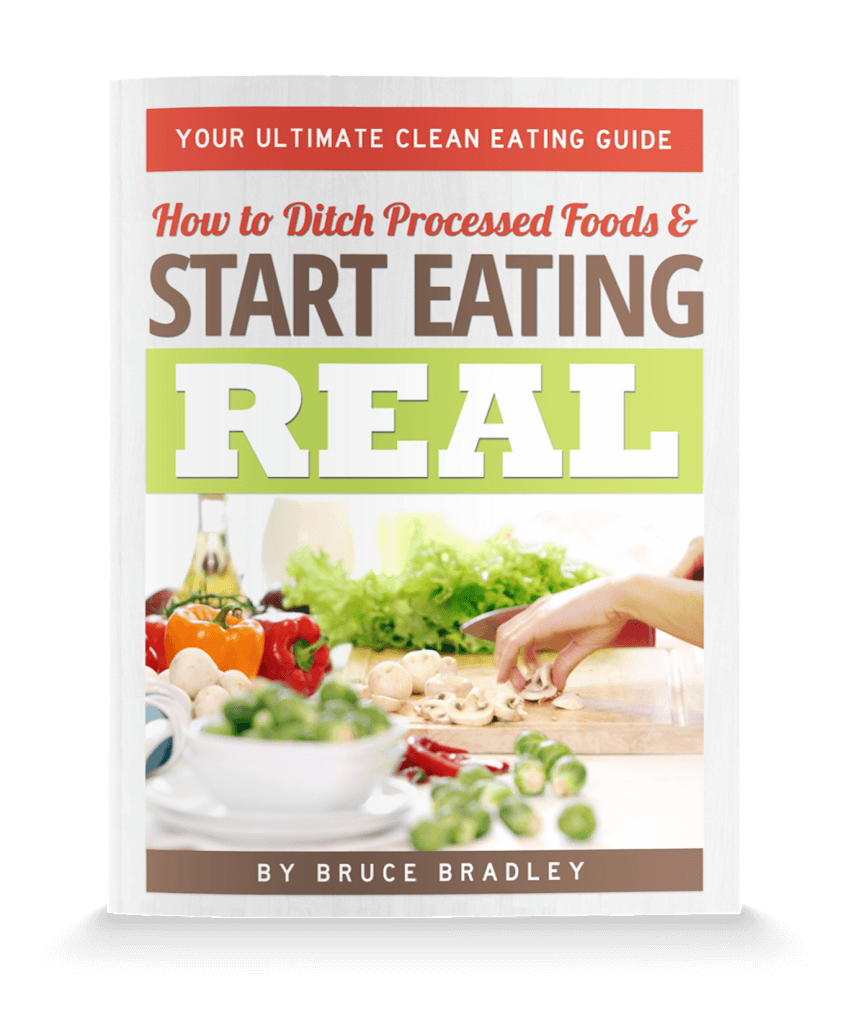
GET MY FREE BOOK NOW!
End the confusion! Learn what’s really in your food and how to take simple steps toward eating healthier!
EAT HEALTHIER TONIGHT!
If you enjoyed this article or recipe may I ask you a favor? Please share it with a friend. Why? Because together we can make a difference and help each other live happier and healthier lives. Thank you!
Notes:
- Source: Mother Jones, “Irradiated Food Sounds Like a Terrible Thing. It’s Actually Really Good” ↩
- Source: Rodale Institute 30-year Farming Systems Trial ↩
- Source: USDA website ↩
- Source: The American Journal of Clinical Nutrition, “Nutritional quality of organic foods: a systematic review” ↩
- Source: Stanford Medicine New Center, “Little evidence of health benefits from organic foods, study finds“ ↩
- Source: New York Times, “Study of Organic Crops Finds Fewer Pesticides and More Antioxidants“ ↩
- Source: Geneticliteracyproject.org, “Study claiming organic food more nutritious ‘deeply flawed’, say independent scientists“ ↩
- Source: BBC News, “Study Sparks Organic Foods Debate” ↩
- [Source: The Guardian,],Chinese farms cause more pollution than factories, says official survey“ ↩
- Source: PBS, Farm Runoff in Mississippi River Floodwater Fuels Dead Zone in Gulf“ ↩
- Source: Nature, a scientific journal, “Comparing the yields of organic and conventional agriculture” ↩
- Source: Rodale Institute 30-year Farming Systems Trial FST Fast Facts ↩
- Source: Berkeley News, Can organic crops compete with industrial agriculture? ↩

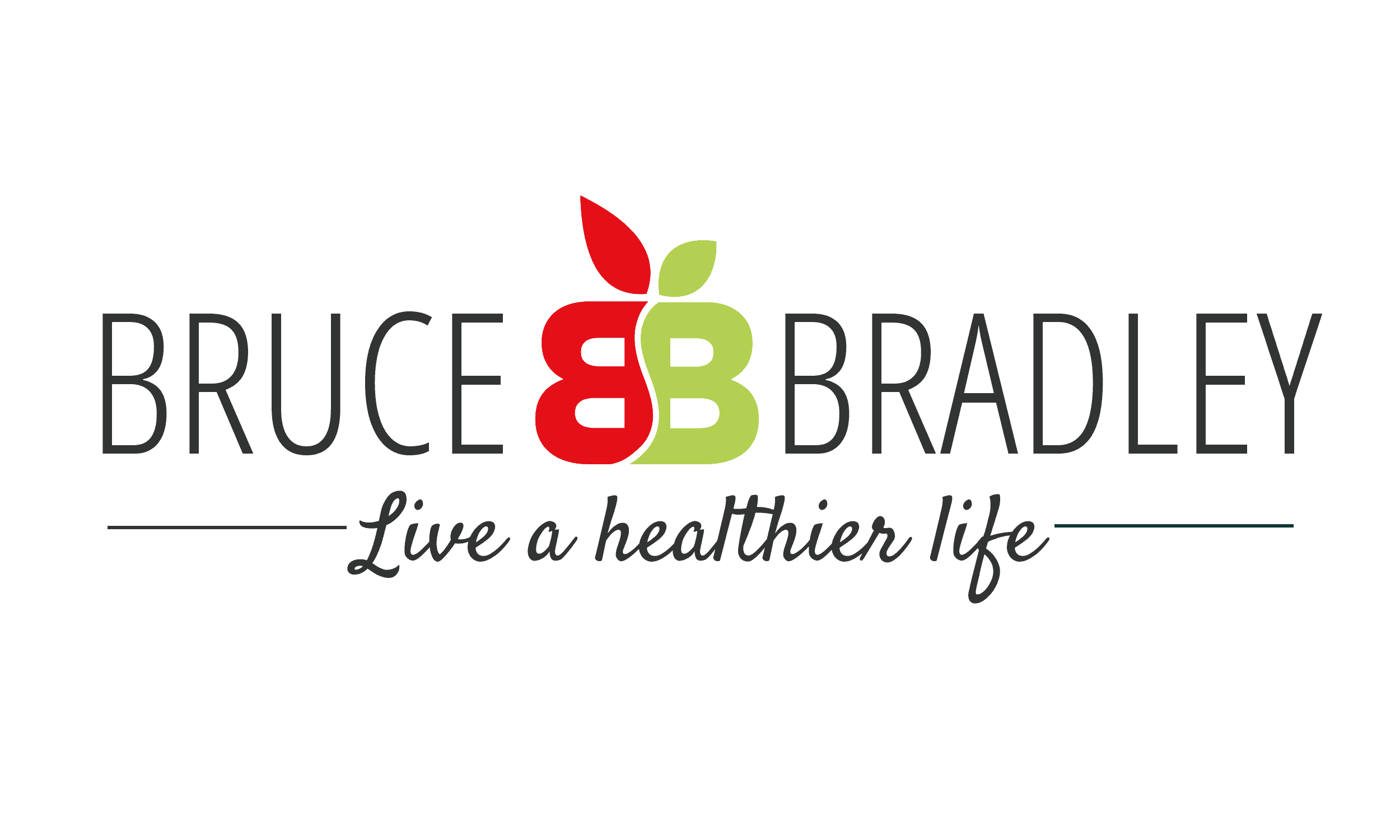
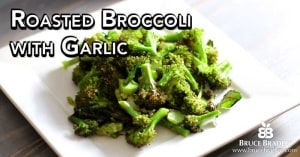


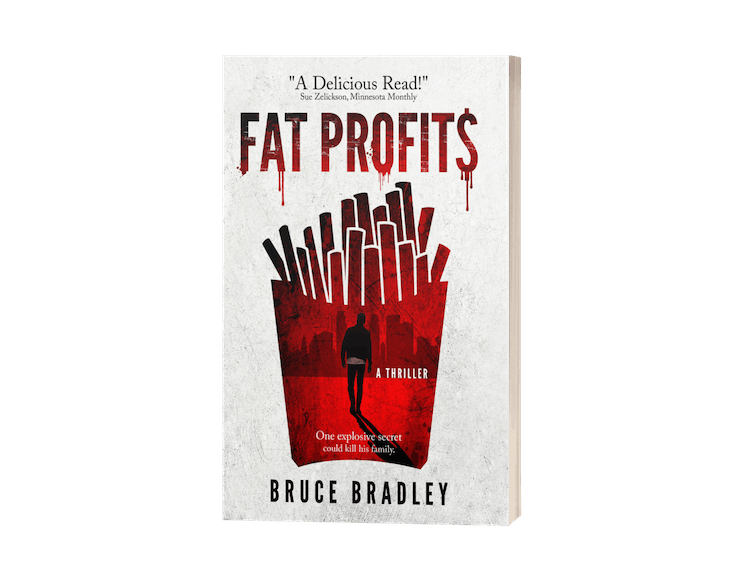
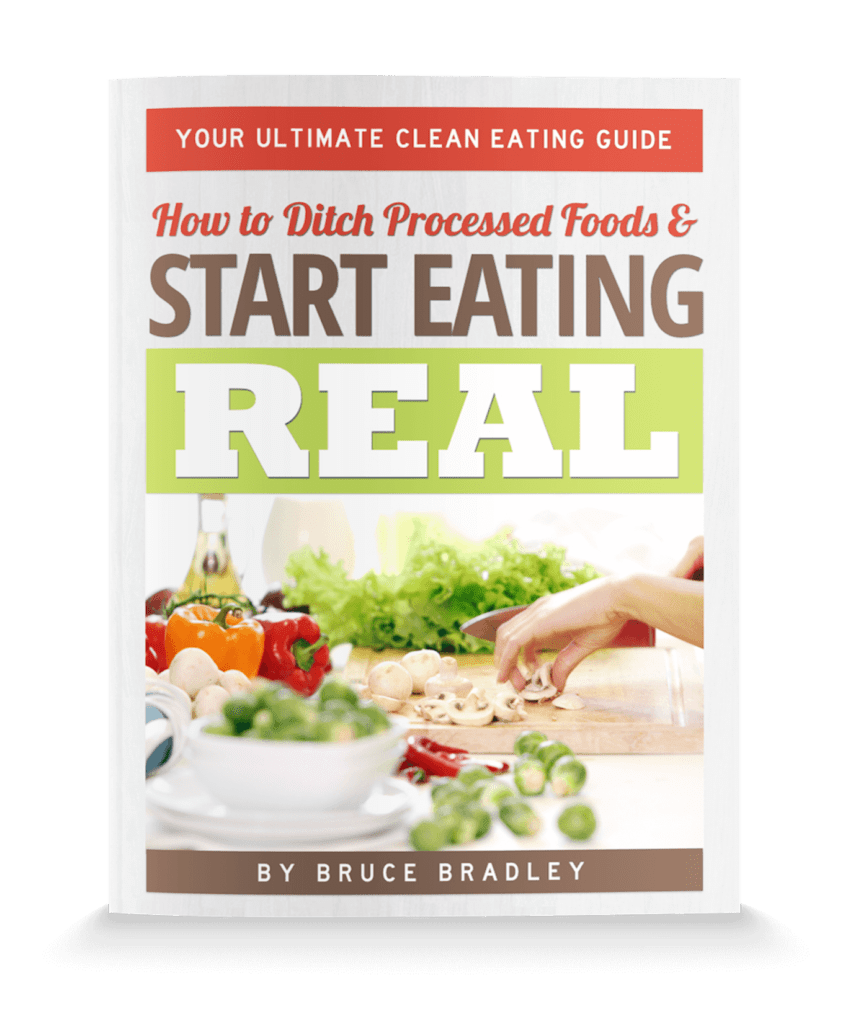
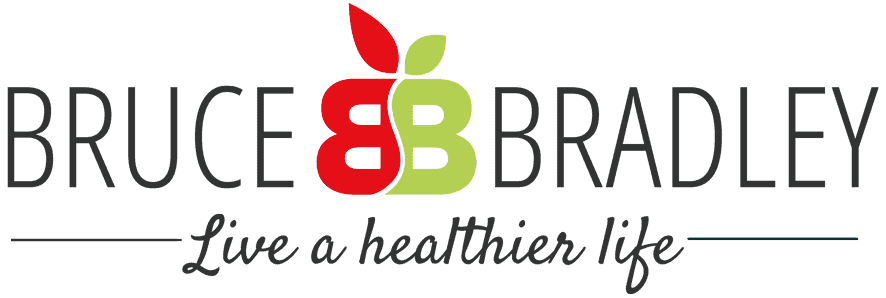
2 Responses
Bruce –
“First and foremost choose REAL food. You’re missing the boat if you’re focusing on organic first and real food second. While organic versions of processed foods may have some benefits, eating REAL food is a better choice no matter what!” – Bruce Bradley
What is YOUR personal definition of REAL FOOD? There are minimally processed Organic Good Foods that are just as healthy as what you may define to be REAL FOOD. These minimally processed Organic Good Foods are REAL FOOD, too!
You can’t say that NATURE’S PATH ORGANIC™ Heritage® O’s are not as good as an Organic Tomato.
To Your Health!
Dennis L. Weaver, MBA, GFG
President/Founder/Producer
Change Your Food – Change Your Life!™, Inc.
425.774.8971
http://www.ChangeYourFoodChangeYourLife.com
Dennis:
Funny you should ask about my definition of REAL food. That’s actually the topic of an upcoming post(s). Nature’s Path Organic Heritage O’s are certainly a great product, and in my mine qualify as REAL food. I’m not sure I’d say they’re better than an organic tomato, but to me that gets to a level of quibbling about what is and isn’t real food.
What concerns me is the growing amount of organic food that is highly processed yet pretends to be healthy. That’s what triggered my remark in this post, and it’s something I’ll be talking about more in an upcoming post.
Thanks for your comment. Oh, and I’m adding your remarks about my commenting policy to that page and I’ll reply to it there.
Bruce